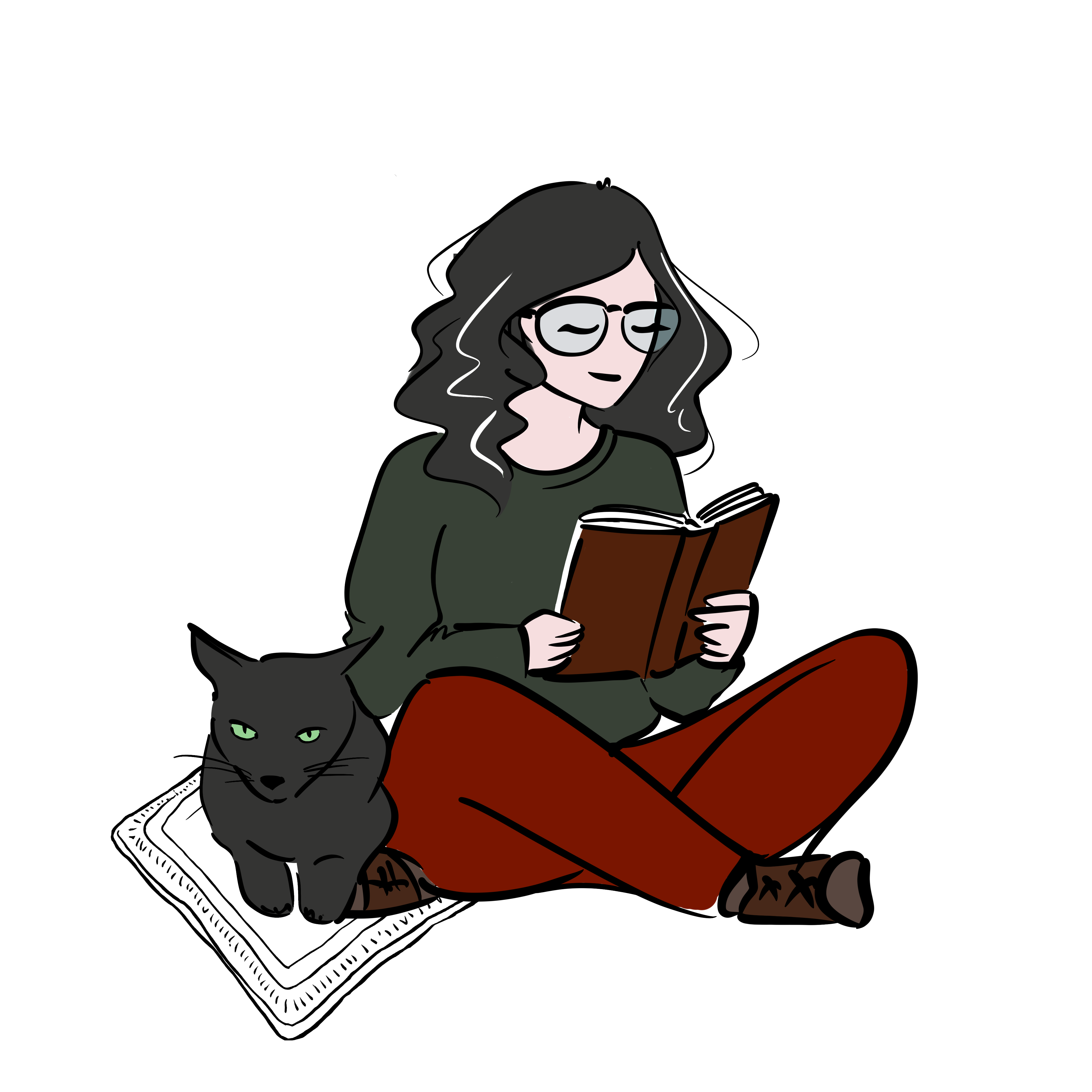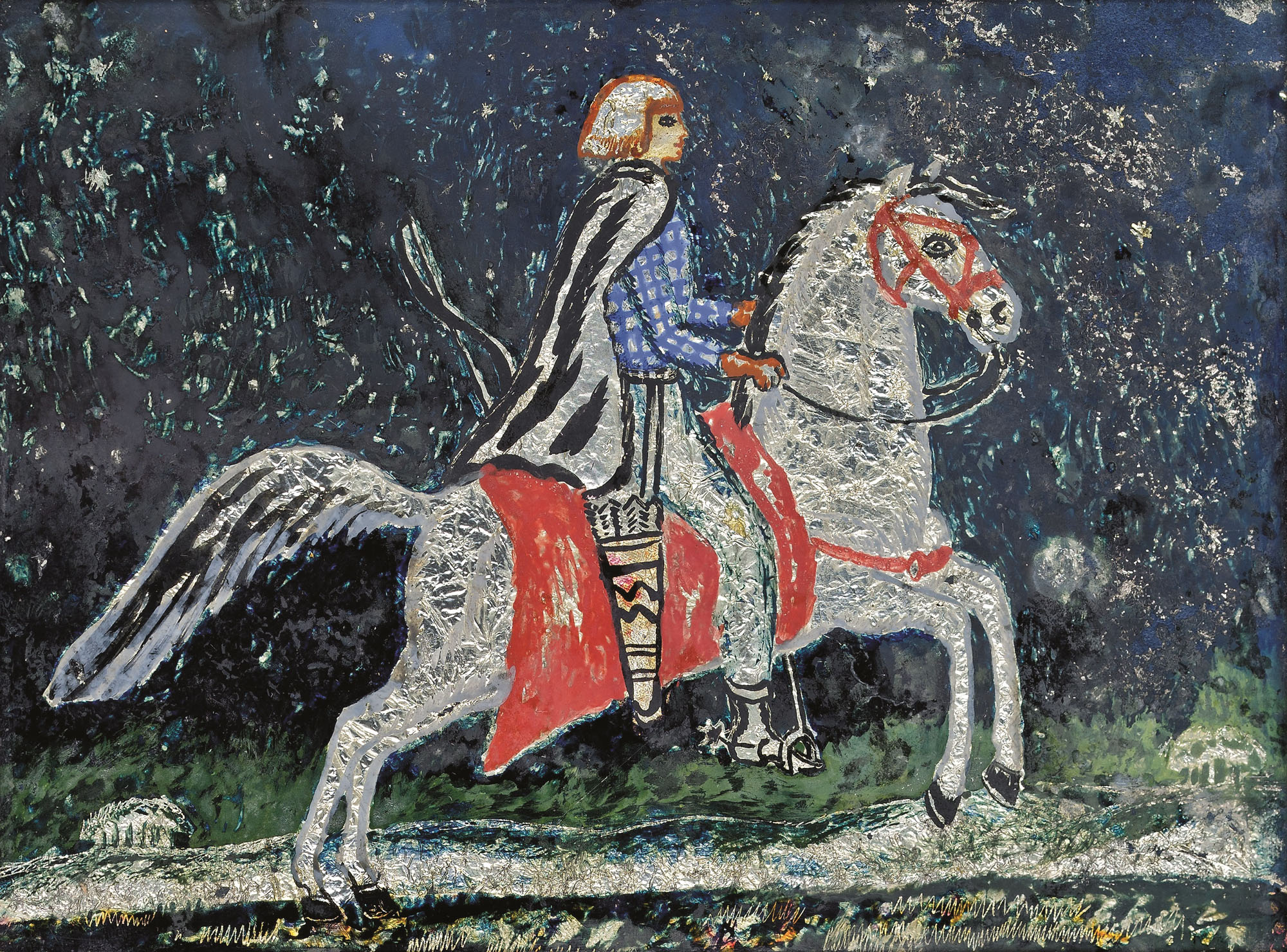Ali Smith’s new book is a fascinating object. In its original, if one can be excused for using that word, version as published in the UK in October 2024, Gliff is a stripped hardback, pure binder’s board on its front and back covers, with the author’s name, a concise blurb, and the title as shimmering purple insertions. The spine is held together by yellow, or, since precision truly matters in this case, mustard fabric. No jacket at all, but a die-cut on its front forms a half-moon. That, in turn, reveals an eye that stares directly at you from the shelf. Opening the cover will reveal this eye to belong to a horse, in an enlarged reproduction of Dora Carrington’s Iris Tree on a Horse. The materiality of things matters in Gliff, so it is only fair that its medium should reflect this. If there has ever been a book that deserves to be read in a physical copy, this is the one. “We choose to be educated by things bigger than something so small it can be worn on a human wrist,” says Rose. Gliff is a work of art; each word matters and coheres, even if not always in a linear, Cartesian sense.
I have long been a fan of Smith’s writing and feel that she is also an extraordinary communicator; to hear her discuss her craft is a gift you must not pass up if the opportunity arises. She is a rare novelist who is just as brilliant in writing short stories, and she never takes any of these literary forms for granted. She also makes sure to bring the reader in: her novels are not obvious, but they are also never aloof. Paraic O’Donnell opens his review of Gliff by stating that “Ali Smith has never been afraid to take cleverness seriously,” and I think that’s precisely it. Smith’s writing is unapologetically clever, stories so deep in love with the many languages of art that they often read like a dismantling and a putting back together. Here, everything begins with a word.
Gliff. In true Smithian fashion, this is absolutely the perfect title, signifying both the novel’s themes and imagery, and its puzzles. Its resistance towards being just one thing. Gliff carries on an interest in interrogating selfhood seen before in works like How to Be Both and the Seasonal Quartet. This search is not for a final answer to circumscribe, but an appreciation of the investigation itself, and the shape-shifting nature of subjectivity. These are the answers Briar finds when they look up a definition for “gliff”, a word their sister Rose is fascinated by, and one she picks as the name for the horse they rescue/buy:
a short moment. A momentary resemblance. A sudden or chance view. A transient glance. A sudden fright. A faint trace or suggestion. An inkling. A wink of sleep. A slight attack or touch of illness. A whiff. A puff. A sudden perceptible smell. A sudden passing sensation either of pain or of pleasure. A scare. A shock. A thrill. A sudden violent blow. A wallop. A nonsense word. A misspelling for glyph. A substitute word for any word. A synonym for spliff. A post-ejaculatory sex act. A mood someone’s partner gets in when they miss their partner too much and get upset about it. An organization that works for drug abuse prevention in Vienna. A brand name for an early AI tech tool used in the development of healthcare. A character in something called Ninjago. A rumour. An impulse. An instant. An unexpected view of something that startles you. A state of nervous disposition. A sudden surprising fall of sunlight. The twinkling of an eye. To glimpse. To frighten. To be abruptly seized with fear. To look at someone or something in an unheeding or hurried or careless manner. To glint. To gleam. To glare. To flare. To strike a glancing blow at someone or something. To evade or escape something quickly. To glimmer like sudden unanticipated light. To dispel snow.
Gliff revolves around two children: Briar, the narrator, and Rose, their sister, as they are chased and displaced by the strange apparatus of a totalitarian state. They are separated from their mother early in the novel, and then apparently abandoned by Leif, the man she left in charge of them. A machine called Supera Bounder draws red lines around their house and, as they later find out, of all houses where “unverifiables” live. Those places are then torn down. Throughout most of the novel, we follow Briar and Rose in their journey. The narrative refuses to over-explain itself: we get flashbacks from their time with their mother, a clear enemy of the regime. A car journey. A visit to a museum. They are clever children endowed with critical thinking who have no place in society because they were not subscribed to the techno-bureaucratic all-seeing structure of the state. The novel is not sceptical of technology at all, as Smith’s nod to the more productive applications of AI suggests, but it does poke fun at our terrifying submission to the smartphone and its various embodiments – watch, pad, camera, glasses. Briar and Rose are outcasts, and so are many others. While this is a fiction, it is by no means a dystopia in its clear reflection of so many aspects of our current experience of reality, one mediated and filtered by our reliance on technology whose mechanics most of us do not quite understand. The anxiety comes, ultimately, from the sense of our willful relinquishing of freedom for convenience’s sake, the despair of a world mediated by practical effects where nothing is quite what it appears to be. Colon – not Colin – the boy from whom the siblings buy the horse, sees them through the filter of his watch-like gadget, which lets him know they are not verified. Years later, Briar is not only in the system, but at its very heart, and manipulates enough information into it to let us know how easy it would be for anyone to have done the same at any point in their past.
Why would anyone anywhere ever want to hurt a swan? my sister said.
You’re a naive too. You can see just by looking at them, Wolf said. They look like they own it. They look like they can’t be had. They look like a challenge.
And they’re edible. And they’re protected by law.
Royal decree. That stuff makes people go crazy.
Yeah but that man didn’t hurt that swan. He wasn’t hurting it. That man was helping that swan, Daisy said.
Maybe, Wolf said. Maybe he was going to eat it when he got home.
The people who come across the children are often unsure of Briar’s gender, and the child does not make any effort to assuage their anxieties. They are both boy and girl and other. It is only when Briar is seized and forcefully “verified” that a choice must be made and they are then pronounced a boy, which also seems to contribute to his remarkable ascension in power. In this time jump, things are much worse than before. Briar is a cog in the machine, and never acknowledges the fact that he used to have a sister. Young people are put to work in inhumane conditions, sifting through batteries without proper protection equipment; terrible, life-altering accidents ensue; punishment for any given mistake is quick, efficient, and harsh. But then again, is it that different from the conditions in many warehouses around the world? Gliff is a haunting novel. It deviates from what we know, and then steps right back into the dystopia of everyday life. The novel’s denouement is a reaffirmation of the powerful pull of freedom even in the direst of circumstances, so it remains staunchly optimistic and true to its unifying image, that of Rose’s stubborn horse, one she could not afford but who refuses his old master and instinctively trusts her authority only, out of affection, out of loyalty. “People are people, people are mysterious, why does anybody do anything?”, says Leif after somebody paints the red line around their house. Like so many other instances in Ali Smith’s works, people are people means both. It means hope and despair, freedom and entrapment, joy and sorrow; but also, sometimes people are a miracle of courage, resisting and extending a hand. Sometimes they can be a somewhat magical horse to ride through the rain and evade capture. A substitute word for any word. The meanings of “gliff” encapsulate its characters and its plot in an unfolding that never ends. Gliff was the novel of the year for me, an absolute marvel that I hope you have a chance to read soon.
Glyph, a sister novel to Gliff, will be published by Hamish Hamilton in September 2025 in the UK.

